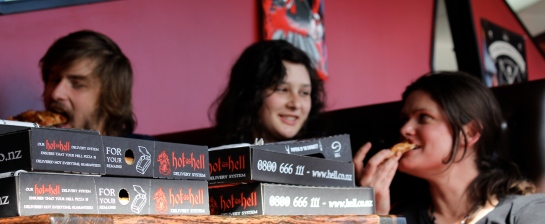It’s said that you can’t make a film good, fast and cheaply, you can only pick two. It goes without saying that we choose ‘good’. And we choose cheap out of necessity, so we have to sacrifice speed. And for Penny Black, and I would think most self-funded films, this works pretty well.
Most of our travel shots were in the can after our road trip to Wellington, but we still have the first act to shoot around Auckland. We all have jobs (not ‘real’ jobs, necessarily 🙂 ) so we’re mostly shooting on the weekends, and though I am inherently impatient and in fact EVERYONE is hanging out to watch the movie, I have to admit that this is an easier way to make a film when you have a small crew, several of whom are doing more than one job.
From my position, having 5 days to prepare for the next weekend shoot gives me time to address any script issues and print new pages for the cast and crew. I unpack the boxes of props, set deco, and other random stuff I always take to set. And, of course, locate and wash the wardrobe, towels, blankets, rags, etc that we’ve used. I have time to confirm any new cast members we have joining the team, double check locations, book vehicles, sort catering, replace anything broken or lost, drop the expenses into the budget, touch base with sponsors (including our pledgeme peeps), break down the scenes we’re filming next and get all the props, wardrobe, and set deco packed, post new pics on facebook, and update this blog.
So in my experience it’s true. You can’t have good, fast and cheap. You can only pick two.
And I think accepting that has given us time to plan, to organise, and to refine our ideas, and overall, to make a better film.
~ Fiona
